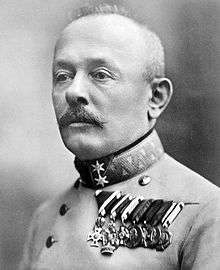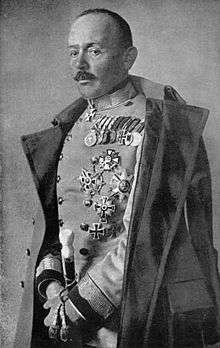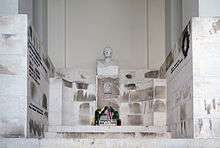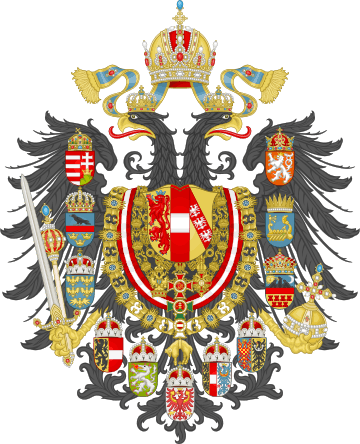Svetozar Boroević
Svetozar Boroević (or Borojević) (13 December 1856 – 23 May 1920) was an Austro-Hungarian field marshal who was described as one of the finest defensive strategists of the First World War.[1] He was given Hungarian nobility as Baron Boroëvić von Bojna, and later rising to the rank of Field Marshal before the end of the First World War in 1918.
Svetozar Boroević von Bojna Svetozar Borojević | |
|---|---|
 Borojević c. 1913 | |
| Born | 13 December 1856 Umetić, Military Frontier, Austrian Empire (now Croatia) |
| Died | 23 May 1920 (aged 63) Klagenfurt, Austria |
| Allegiance | |
| Service/ | Austro-Hungarian Army |
| Years of service | 1872–1918 |
| Rank | Field Marshal |
| Battles/wars | See battles
|
| Awards | Military Merit Cross, Cross of the Order Star of Romania, Persian Order of the Sun and the Lion, Order of the Iron Crown (Austria), Knights' Cross of the Order of Leopold, Military Order of Maria Theresa |
Private life
Origin
Boroević was born on 13 December 1856 in the village of Umetić, Croatian Military Frontier. His father Adam was a Grenzer (border guard) officer,[2] his mother was Stana (née Kovarbašić von Zborište).[3] He was baptized in the Eastern Orthodox Church,[4] most likely in the parish church in Mečenčani, where his father served.[5]
Some sources state that Boroević (Serbian Cyrillic: Бороевић) was an ethnic Serb or of Serb origin.[6][7][8][9][10][11][12][13][14] while others regard him as an ethnic Croat or of Croat origin.[4][15][5][5][16][17][18][19][20][21] Boroević himself stated that he was a Croat[22][23] and that Croatia was his homeland.[5]
Family
His father Adam Boroević took part in wars in Italy, Hungary and Austro-Hungarian campaign in Bosnia and Herzegovina in 1878. He was awarded Silver medal for bravery.[24] As an old man, Boroević's father had built a Serbian Orthodox church as his endowment in Mečenčani, which was consecrated in 1877.[25]
Boroević had a brother, Nikola, a colonel who also received Austrian noble status in 1917.[26]
In 1889, he married Leontina von Rosner, a daughter of a late Austrian colonel, Friedrich Ritter von Rosner. The couple had one son, Friedrich Borojević von Bojna, named after his mother's father. The son died in 1918.
Military career
Early career
Boroević joined cadet school at the age of ten. After finishing grade school he moved to Kamenica and later Graz where he studied in military academies. He attended the Liebenau cadet school in 1875.[2]
He advanced quickly through the ranks (corporal in 1872, lieutenant in 1875) and became a commander in the Croatian Home Guard, an equivalent to the Hungarian Honved and the Austrian Landwehr, defensive troops of parts of the Danube Monarchy, in times of peace not belonging to the Imperial & Royal Army. Before the First World War, he commanded the 42nd division of the Croatian Home Guard.[27] In 1903 he was formally released from the Home Guard, already having been assigned to the Imperial & Royal Army in 1898. During war, the defensive troops were part of the Armed Forces commanded by the Supreme Army Command (Armeeoberkommando) and could be used at the front.
He distinguished himself in the Austro-Hungarian occupation of Bosnia and Herzegovina in 1878 and was promoted to the rank of Oberleutnant in 1880. Between 1887 and 1891 he underwent additional military training and worked as an instructor after that, becoming a major in 1892. In 1897, he was promoted to the rank of Oberst (colonel) and appointed a chief of staff of the Seventh Corps of the Imperial & Royal Army in June 1898, where he remained until February 1904. In 1904, he was promoted Major General (Generalmajor). In 1905, he was created a Hungarian nobleman (since Croatia was one of the Lands of the Holy Hungarian Crown) with the attribute von Bojna by the Emperor & King. In 1908, the monarch made him Field Marshal Lieutenant (Feldmarschallleutnant). He became the commander of the Sixth Corps of the I & R Army in April 1912 and in 1913 General of the Infantry.
World War I

When World War I started in 1914 he was in command of the Sixth Corps on the Eastern Front. In early September 1914 he became commander of the Third Army, and in early October he liberated Fort Przemysl, providing a temporary relief in the Siege of Przemyśl. His troops then pulled back to hold positions around Limanowa, at the Dukla mountain pass, and elsewhere on the Carpathians, stopping the Russians from breaking out on the Danube. The Russian counter-offensive in February and March 1915 almost managed to push Boroević's Third Army back towards Hungary, but they managed to hold just enough for the German reinforcements to arrive and save the already endangered Budapest and the Pressburg bridgehead. They then proceeded to join the general Austro-Hungarian—German offensive (with the Austro-Hungarian Fourth Army under Archduke Joseph Ferdinand and the German Eleventh Army under Mackensen) that pushed back the Russians and eventually retook Przemysl.
Boroević did not remain on the Eastern Front long enough to see Przemysl liberated in June, because on 25 May 1915 he was sent to the new Italian front, taking part of the Third Army with him and leaving the rest to Army Group Mackensen. There Boroević became the Commander of the Fifth Army, with which he organized a defense against the Italians and broke countless offensives. Franz Conrad von Hötzendorf, Chief of Staff (Generalstabschef), Supreme Army Command (Armeeoberkommando), recommended that they fall back and avoid trying to defend the better part of today's Slovenia, claiming it was indefensible. Boroević persisted with thirty of his detachments, maintaining that the Slovenes would stand their ground when faced with the defense of their own country. This appealed to Emperor Francis Joseph and he was given command on the Soča (Isonzo) front.
Boroević's troops contained eleven Italian attacks and he was hailed as the Knight of Isonzo in Austria-Hungary, while his soldiers adored him and called him Naš Sveto! ("Our Sveto!"). For valor in combat, he was promoted to the rank of Generaloberst on 1 May 1916. On 23 August 1917 he rose to the position of commander of the Southwestern Front, which was later renamed Army Group Boroević. In January 1918, he opposed Hungarian proposals to split Austria-Hungary's Army into separate Austrian and Hungarian units.[28] He became Field Marshal on 1 February 1918 and was also awarded numerous medals, including the highest order for Austro-Hungarian soldiers, the Military Order of Maria Theresia.
He led to defeat the southern prong of the last Austro-Hungarian offensive at the Battle of the Piave River.[29] The front was maintained until end of October 1918, when the Italian army launched the decisive offensive of Vittorio Veneto and non-Austrian troops left their positions following the secessions of their nations from the dual monarchy (Czechs and Slovaks on 28 October, South Slavs on 29 October, Hungary on 31 October). After that Boroević fell back to Velden, where he sent a telegram to the Emperor offering to march on Vienna to fight the anti-Habsburg revolution in the imperial capital. It is not certain whether the Emperor has been given this message (Boroević doubted it); the offer was refused on behalf of the Emperor. After the Imperial & Royal Army had been demobilized by the Emperor on 6 November, Boroević was retired, by the I & R War Ministry in liquidation, by 1 December 1918.
After the war

After the demise and disintegration of Austria-Hungary, Boroević decided to become a citizen of the newly created Kingdom of Serbs, Croats and Slovenes. He was not welcome despite offering his services to the National Council of Slovenes, Croats and Serbs.[30] So he stayed in Carinthia, now Austria's southernmost state; his personal belongings, which were on transport in Slovenia, the former Austrian crownland of Carniola, were confiscated there. Boroević could not understand the mean treatment he had to experience, "the only field marshal the Southern Slavs had ever produced", as he wrote in his memoirs.
Boroević died in a hospital at Klagenfurt, the capital city of Carinthia. His body was transferred to Vienna where he was entombed at the Central Cemetery (Grave # 62 in the New Arcades to the right of the Church of St. Charles Borromeo). The grave had been paid for by the former emperor Charles, who lived in Switzerland then. He could not take part in the funeral, since he had been banished from Austria for his lifetime by the Habsburg Law since 3 April 1919.
Honors
Honorary degree
In 1916, with the approval of the Emperor Franz Joseph I, on the proposal of the Faculty of Law and the Senate of the University of Zagreb, Svetozar Borojević and Archduke Eugen were awarded the University's highest honorary degree, Doctor Honoris Causa in the field of social sciences, for their victory over the enemy and especially for the protection of hereditary grudge, and rights and cultural progress of Croats ("Ob eximia in limitibus imperii strenue defendendis ac imprimis in Croatum paterno solo iuribus atque litterarum et artium progressu tuendis merita"). The award ceremonies were held on 30 January 1916 (for Archduke Eugen) and 1 February 1916 (for Svetozar Borojević) at the Fifth Army’s military apartment, 305 Military Field Post on the Italian front. Delegation for the award was made of Josip Šilović; Milorad Stražnicki, dean of the Faculty of Law; Fran Barac, rector; Robert Frangeš-Mihanović, sculptor; and Andrija Kišur, clerk.[31][32]
Honorary citizenship
- Croatia
- Honorary citizen of Karlovac, 1915.[33]
- Honorary citizen of Sinj, November 1915; Sinj Municipality Council determined that the most beautiful street in the city would bear his name.[34]
- Honorary citizen of Požega, Slavonski Brod and Varaždin, November 1915.[34]
- Honorary citizen of Zagreb, March 1916.[35]
- Honorary citizen of Pazin, 5 May 1916. On 13 August 1919, during the occupation of Istria by the Kingdom of Italy, the City Assembly revoked his title.
- Honorary citizen of Janjina municipality, May 1917.[34]
- Honorary citizen of Bakar, Koprivnica, Hrvatska Kostajnica and Petrinja.[36]
- Slovenia
See also
References
- http://www.austro-hungarian-army.co.uk/biog/boroevic.htm
- Dupuy 1992, p. 94: "the son of a Grenzer (border guard) officer; attended the Liebenau cadet school (1875),"
- Mirnik 2009, p. 1.
- Rauchensteiner, Manfried (2014). The First World War and the end of the Habsburg monarchy, 1914-1918 (Revised and expanded ed.). V&r Academic. p. 406. ISBN 3205795881.
- Pojić 2006, p. 4.
- Matica Srpska 1975: "Био је зван на ручак приликом посете познатог аустријског војсковође, пореклом Србина, Светозара Боројевића."
- Horvat 1989, p. 344
Svetozar Borojević de Bojna, Srbin s Banije (selo Borojevići kraj Mečenčana, odnosno Kostajnice)
- Hrvatski biografski leksikon. 2. 1989. pp. 168–169.
[described as "of Serb Grenzer family descent"]
- Schindler 2001, p. 46
son of a Serbian Grenzer family from Croatia.
- Palmer 1970
regiments on this front; and one of the most successful Habsburg commanders was in fact a Serb from the old 'Military Frontier' region, Marshal Svetozar Boroevic, whose family had fought for the emperors through many generations.
- Tucker 1996, p. 135.
- Kloot, William G. Van der (2010). World War I Fact Book: The Great War in Graphs and Numbers. Amberley. ISBN 978-1-84868-447-8.
- Schindler, John R. (December 2015). Fall of the Double Eagle: The Battle for Galicia and the Demise of Austria-Hungary. U of Nebraska Press. ISBN 978-1-61234-806-3.
- Bradford, James C. (December 2004). International Encyclopedia of Military History. Routledge. ISBN 978-1-135-95034-7.
- Morselli, Mario (May 13, 2013). Caporetto 1917: Victory or Defeat?. Routledge. p. 41.
- Palmer 2000, p. 185.
- Tucker 1996, p. 762.
- Burg 2004, p. 67.
- Neiberg 2004, p. 47.
- Keegan & Wheatcroft 1976, p. 48: "A Croat (the Croats prided themselves on their particular loyalty to the emperor)."
- Paul Miller, Claire Morelon, 2018, Embers of Empire: Continuity and Rupture in the Habsburg Successor States after 1918, https://books.google.hr/books?id=osNiDwAAQBAJ&pg=PA123&dq=Field+Marshal+Boroevi%C4%87+might+have+honored+his+Croatian+origin&hl=hr&sa=X&ved=0ahUKEwiyovDs3OjoAhUOuIsKHeZVBuMQ6AEIJjAA#v=onepage&q=Field%20Marshal%20Boroevi%C4%87%20might%20have%20honored%20his%20Croatian%20origin&f=false #page= 123
- Pojić 2006, pp. 9–10.
- Tado Oršolić, Jugozapadno talijansko bojište i maršal Borojević u dalmatinskim novinama Narodni list i Smotra Dalmatinska (1915.-1918.), p. 95. and footnote 22 on p. 95., u: Feldmaršal Svetozar barun Borojević od Bojne (1856.-1920.). Zbornik radova, Hrvatski institut za povijest, Zagreb, 2011., (editor Marino Manin, PhD), ISBN 978-953-7840-03-7
- Roksandić, Drago (2007). Svetozar Borojević od Bojne (1856-1920) Lav ili lisica sa Soče?. Zagreb: Vijeće srpske nacionalne manjine grada Zagreba. p. 19.
- Roksandić, Drago (2007). Svetozar Borojević od Bojne (1856-1920) Lav ili lisica sa Soče?. Zagreb: Vijeće srpske nacionalne manjine grada Zagreba. p. 20.
- Mirnik 2009, p. 62: "a car i kralj Karlo I austrijsko plemstvo njegovu bratu, pukovniku Nikoli dana 16.III. (3.V.) 1917. god."
- Schindler 2001, p. 46.
- Tucker 2006, p. 355.
- Raab, David "Battle of the Piave: Death of the Austro-Hungarian Army, 1918" (2004) pag. 77
- Hrvatski biografski leksikon, volume 2, 1989, pp. 168-169
- Ivan Mirnik, Dvostruki počasni doktorat Zagrebačkoga sveučilišta 1916. godine, Društvo za povjesnicu Zagrebačke nadbiskupije "Tkalčić", Zagreb, 2012., ISBN 978-953-6729-37-1, p. 16.
- Honorary Doctors of the University of Zagreb 1913–2013
- "historiografija.hr: Agneza Szabo, Gradska uprava i privredni razvoj Karlovca 1884.-1914., p. 184., retrieved 14 December 2017" (PDF).
- Tado Oršolić, Jugozapadno talijansko bojište i maršal Borojević u dalmatinskim novinama Narodni list i Smotra Dalmatinska (1915.-1918.), p. 98., u: Feldmaršal Svetozar barun Borojević od Bojne (1856.-1920.). Zbornik radova, Hrvatski institut za povijest, Zagreb, (editor Marino Manin, PhD), ISBN 978-953-7840-03-7
- "Grad Zagreb službene stranice". www.zagreb.hr.
- Ivan Mirnik, Dvostruki počasni doktorat Zagrebačkoga sveučilišta 1916. godine, Društvo za povjesnicu Zagrebačke nadbiskupije "Tkalčić", Zagreb, 2012., ISBN 978-953-6729-37-1, p. 32.
- Badalič, Matej. "Svetozar Boroević von Bojna - Krajevna skupnost Osek-Vitovlje". www.osek-vitovlje.si.
Sources
- Burg, David F. Burg (2004). Almanac of World War I. University Press of Kentucky. p. 67. ISBN 978-0-8131-9087-7.CS1 maint: ref=harv (link)
- Dupuy, Trevor N. (1992). Harper Encyclopedia of Military Biography. New York: HarperCollins Publishers. ISBN 978-0-7858-0437-6.CS1 maint: ref=harv (link)
- Horvat, Josip (1989). Politička povijest Hrvatske, Volume 1 (in Croatian). August Cesarec.CS1 maint: ref=harv (link)
- Keegan, John; Wheatcroft, Andrew (1976). Who's who in military history: from 1453 to the present day. Morrow. p. 48. ISBN 978-0-688-02956-2.CS1 maint: ref=harv (link)
- Mirnik, Ivan (2009). "Feldmaršal Svetozar barun Boroević od Bojne na medaljama" (PDF). Peristil (in Croatian). 52 (1): 61–74.CS1 maint: ref=harv (link)
- Neiberg, Michael S. (2004). Warfare & society in Europe: 1898 to the present. Routledge. ISBN 978-0-415-32718-3.CS1 maint: ref=harv (link)
- Palmer, Alan (1970). The lands between: a history of East-Central Europe since the Congress of Vienna. Macmillan.
- Palmer, Alan (2000). Victory 1918. Grove Press. ISBN 978-0-8021-3787-6.CS1 maint: ref=harv (link)
- Pojić, Milan (2006). Ćosić, Stjepan (ed.). "Vojskovođa Svetozar Boroević 1856-1920" (PDF) (in Croatian). Zagreb: Croatian State Archives. Retrieved 1 April 2019.CS1 maint: ref=harv (link)
- Schindler, John R (2001). Isonzo: The Forgotten Sacrifice of the Great War. Greenwood Publishing Group. ISBN 978-0-275-97204-2.CS1 maint: ref=harv (link)
- Tucker, Spencer C. (2006). World War I: A Student Encyclopedia'. ABC-CLIO. ISBN 978-1-85109-879-8.CS1 maint: ref=harv (link)
- Tucker, Spencer C. (1996). The European Powers in the First World War. Taylor & Francis. ISBN 978-0-8153-0399-2.CS1 maint: ref=harv (link)
- Šurmin, Đuro (1904). Hrvatski preporod: Od godine 1836-1843 (in Croatian). Tisak Dioničke Tiskare.CS1 maint: ref=harv (link)
- Hrvatski biografski leksikon [Croatian biographical lexicon] (in Croatian). 2. Miroslav Krleža Lexicographical Institute. 1989. pp. 168–169. ISBN 978-86-7053-015-7.CS1 maint: ref=harv (link)

External links
| Wikimedia Commons has media related to Svetozar Boroëvić von Bojna. |

